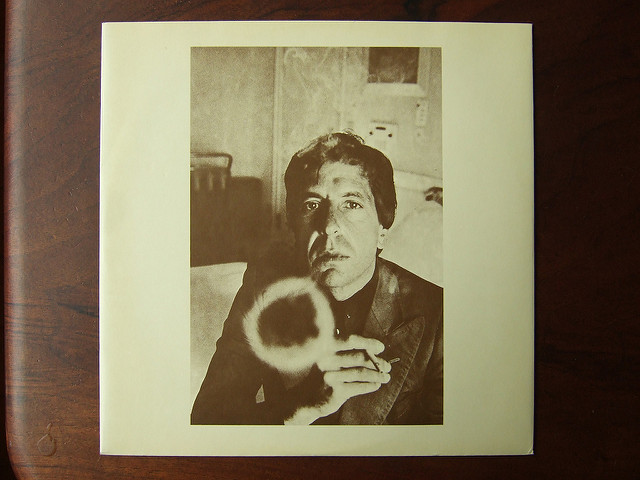Love at Half Mast

Photo by Piano Piano!
Adapted from "Amour en berne," Francine Pelletier's column in Le Devoir about the death of Leonard Cohen, with permission from Francine Pelletier and Le Devoir.
Leonard Cohen has now been laid to rest beside his parents and grandparents in Mount Royal's Shaar Hashomayim cemetery.
I can't let him go without my own small offering—without saying what this irreplaceable artist represented for me, for my generation and for women of my generation in particular. Had he been a church, we would have never left—we would still be lighting candles and bellowing out hallelujahs.
Cohen represented so many things to so many people. He embodied the Beat Generation of the sixties, the counterculture of the seventies and the centuries-old Jewish intellectual tradition. He was poetry that swings and folk music that goes straight for the jugular. He was zen meditation. He was the concert maestro who, at the age of seventy-five, had us dancing in the aisles.
Bob Dylan once asked Cohen how long it had taken him to compose his iconic ballad, “Hallelujah.” "Two years," he answered, even though it had taken him more than five. Cohen then asked Dylan how much time he had put into writing “I and I,” a song that he admired. "Fifteen minutes," Dylan replied.
Everything he did, he did with his signature intensity, diligence and reverence for words. There are days when you wonder if the right people are being chosen for the Nobel Prize, to say nothing of who is entitled to a state funeral.
Beyond his loyalty for Montreal, his fealty to music and poetry, the bard with the gravelly voice offered even better. He gave us love.
Cohen allowed us to believe in love at a time when consecrated unions—monogamy, partnership for life, the institution of marriage—were falling apart. When women refused to be mens’ property, a notion legalized through marriage, romantic partnerships had to be stripped down and given a new form. But we couldn’t turn our backs on a centuries-old tradition without smashing a few pots.Cohen, saviour, explored the maelstrom with passion; he re-sanctified what had been desecrated:
If you want a lover
I'll do anything you ask me to
And if you want another kind of love
I'll wear a mask for you
Looking back, it's a wonder any of us survived this emotional roller coaster. But then, we had Cohen’s honesty and fervour and his infinite capacity tobe danced to the end of love. Quebec's other great bard, Richard Desjardins, given to soaring expressions of love and longing, was also a beacon of hope in these times of upheaval. But he arrived later than Cohen, and without the same searing devotion or religious incantation.
To men, Leonard said: be tender, and for want of fidelity, be true. To women, he whispered: be who you want to be, we will love you anyway.
Even today, especially today, what woman doesn't need to hear that everything will be okay? That she isn't too old, too headstrong, too loose or too clueless? While old insults still fly (slut, feminazi, man hater),who doesn't need the succour of open arms, the blessing that comes only from going over to the other side, of knowing someone cares?
“The emergency never ends,” Cohen said in a Globe and Mail interview a few years ago. “Everybody’s heart gets broken. Everybody gets creamed.”
Leonard Cohen taught us to look pain right in the eye and to lick our wounds. Better still, he showed us that there was something to learn from a broken heart.
There is a crack in everything/that's how the light gets in. This was the chorus we all sang on the Saturday in mid-November after he died—men, women and children all huddled outside his house on Marie-Anne Street, intent on leaving our own imperfect offering.
Dear Leonard, dear prince of darkness, thank you for the light.
Francine Pelletier is one of Quebec's most respected journalists, an award-winning broadcaster and documentary filmmaker who has written for La Presse, the Gazette and, since 2013, for Le Devoir. She is known for her work on CBC's The Fifth Estate and as a parliamentary correspondent for Le Point on Radio-Canada. Pelletier is one of the founders of the feminist magazine La Vie en rose. Her essays on feminism, Second début: Cendres et renaissance du féminisme,were published by Atelier 10 in 2015.





